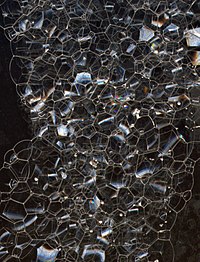
Photo from wikipedia
In order to resist bubble loading, anisotropic composite materials are the development direction of the future. The objective of this paper was to experimentally investigate the hydrodynamic performance of anisotropic… Click to show full abstract
In order to resist bubble loading, anisotropic composite materials are the development direction of the future. The objective of this paper was to experimentally investigate the hydrodynamic performance of anisotropic laminate composite plates, with a focus on the effect of its anisotropic characteristics on single bubble migration. In these experiments, the bubble was generated in a transparent water tank filled with sufficiently degassed water by Joule heating at the connecting point of the electrodes through the discharge of a 6600 μF charge to 800 V, and a high-speed camera system with a recording speed of 40,000 frames per second was used to record the temporal evolution of bubble patterns and the dynamic responses of the laminated composite plates. The results are presented for two anisotropic cantilever composite beams with different ply angles, namely, 0° and 30°. Several variables, such as the shapes of the bubble, the curved trail of motion of the bubble center, bubble collapse time, and bubble initial standoff distances were extracted from the photographic images. The results showed that bubble migration near the 30° plate presents a curved bubble trail with an evident tilted angle during the collapse and rebound stages, which is very different from bubbles that all move vertically above the 0° plate. Furthermore, a characterization method for bubble migration was proposed to quantitatively describe the curved bubble trails and the deformation of the composite beams in temporal and spatial scales. This method shows that the curved bubble trails near the 30° plate are closely related to the dynamic response of composite beams, with a focus on the bending-twisting coupling effect.
Journal Title: Micromachines
Year Published: 2021
Link to full text (if available)
Share on Social Media: Sign Up to like & get
recommendations!